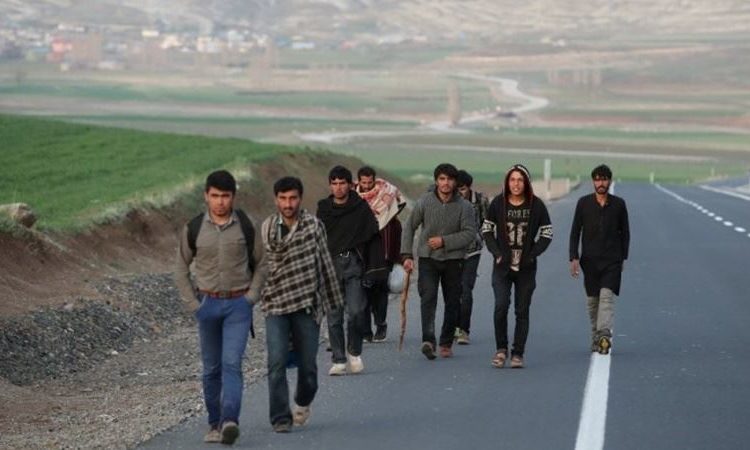Levent Kenez/Stockholm
The Turkish government’s stance against a new influx of refugees from Afghanistan is getting tougher. This week President Recep Tayyip Erdoğan repeatedly said Turkey did not have the capacity to accommodate a new wave of newcomers and that Turkey would not become Europe’s refugee warehouse. Harshly criticizing the opposition for manipulating figures for political gain, Erdoğan announced that there are around 300,000 Afghans, both registered and unregistered — refugees in a foreign country illegally or otherwise without permission — in Turkey. Interior Minister Süleyman Soylu yesterday shared more detailed figures, confirming the president’s remarks. However, a quick study by Nordic Monitor shows that official figures do not fully reflect the situation on the ground.
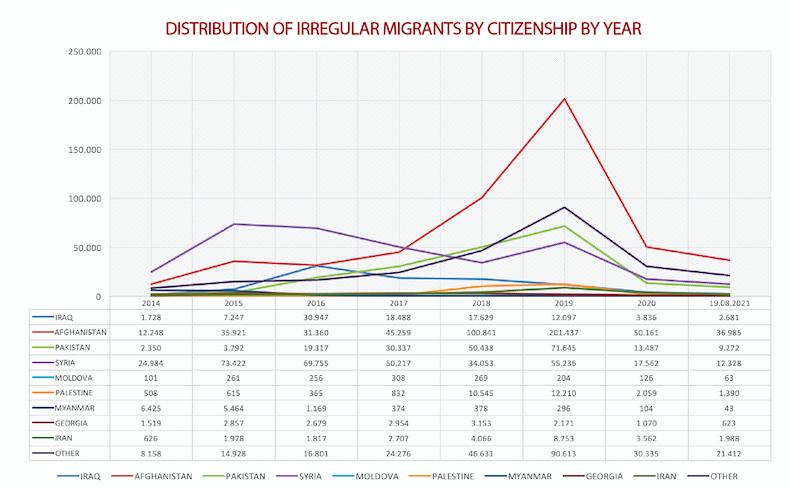
According to Soylu Turkey has caught 460,000 illegal Afghan migrants since 2016. Some 15 percent of these migrants were apprehended repetitively, meaning that the same person was caught and deported several times. Soylu claimed that 151,000 of them were deported to Afghanistan and that 80,000 of the remaining 250,000 are now under international protection provided by the UN. Turkey has reportedly granted residence permits to 20,000 Afghans. Soylu added that 150,000 Afghans have left Turkey for third countries, referring to international figures. The minister concluded that there are 182,000 registered Afghan migrants in Turkey, with a total of 300,000 including unregistered individuals.
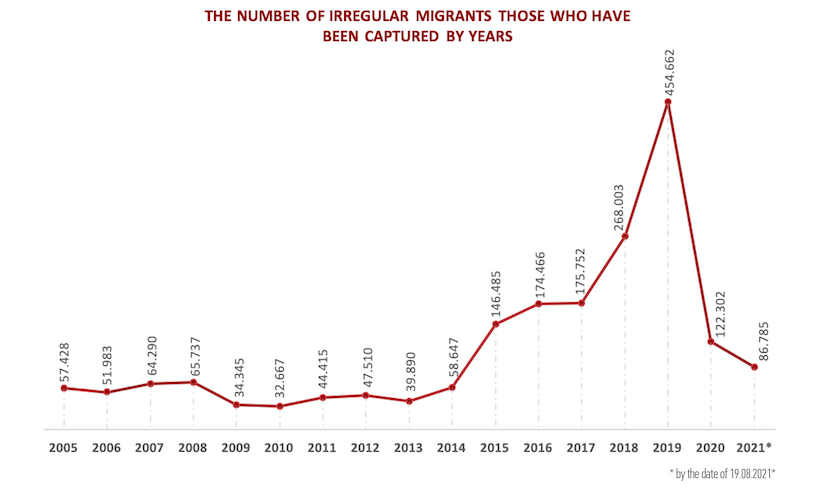
First of all, when explaining the number of Afghan refugees, Minister Soylu ignores the official data on at least 50,000 Afghan migrants between 2014 and 2016, which was announced by Turkey’s General Directorate of Migration Management.
Considering that a minimum of 15,000-20,000 Afghan refugees entered Turkey illegally each year between 2005 and 2014, based on a projection that around 40 to 50 percent of total refugees are Afghans, some 150,000-200,000 Afghan refugees were not included in the minister’s calculations.
Stating that some of the same people are caught and deported more than once, the minister not only undermines the reliability of the statistics but also admits that the same person can re-enter Turkey without any hindrances.
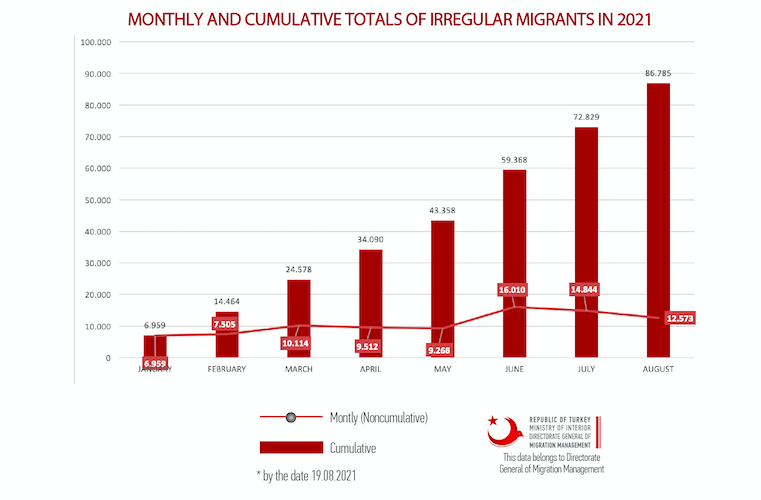
Soylu claimed that 151,000 Afghans have been deported since 2016, an unreliable figure that is not based on concrete evidence. According to data obtained by Nordic Monitor, the number of Afghans deported by Turkey is far below the minister’s figure. For instance, an official UN Refugee Agency statement said that Turkey was able to deport only 6,000 Afghans in 2020. According to a news report by the state-run Anadolu news agency, Turkey has so far deported 13,000 Afghans this year. Amnesty International in 2018 announced that Turkey was going to deport around 10,000 Afghans in the same year. Turkey would have had to have sent at least 30,000 Afghans back home by plane each year starting from 2016 in line with the data announced by the minister.
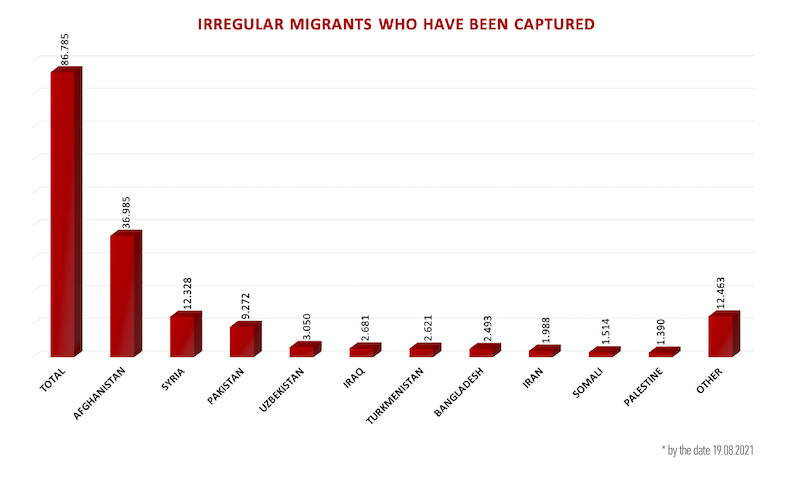
Professor Murat Erdoğan, vice president of the Research Center on Asylum and Migration in Ankara, estimates that the current Afghan population in Turkey is at least 500,000. According to Erdoğan, many Afghans try to leave Turkey shortly after arriving, but when they fail, they decide to stay.
Turkey traditionally does not grant immigrant status to refugees. No matter how long they stay or work in Turkey, very few can become citizens and only their residence permits are extended. Nordic Monitor previously reported that Afghans are now buying more and more homes in order to acquire citizenship or residence permits thanks to a real estate campaign to encourage the sale of housing to foreigners to meet its foreign exchange needs.
A worsening economy and the opposition’s pressure on refugees, especially Syrians, are causing a radical change in the government narrative. Erdoğan often stated in the past that hosting Syrian refugees in Turkey was a religious duty as well as a duty of conscience. It is no secret that Erdoğan holds a trump card against the European Union by keeping Syrian refugees in Turkey and that this prevents the EU from imposing any sanctions for his anti-democratic actions against his critics.
However, the changing public mood shows that Erdoğan will not be able to use refugees or irregular migrants at the negotiating table for much longer. President Erdoğan this week said for the first time that he was aware of the Turkish public’s unease about refugees. He reiterated that the country had reinforced its border with Iran with the military, gendarmerie and police and that a wall being erected along the frontier was nearing completion.

